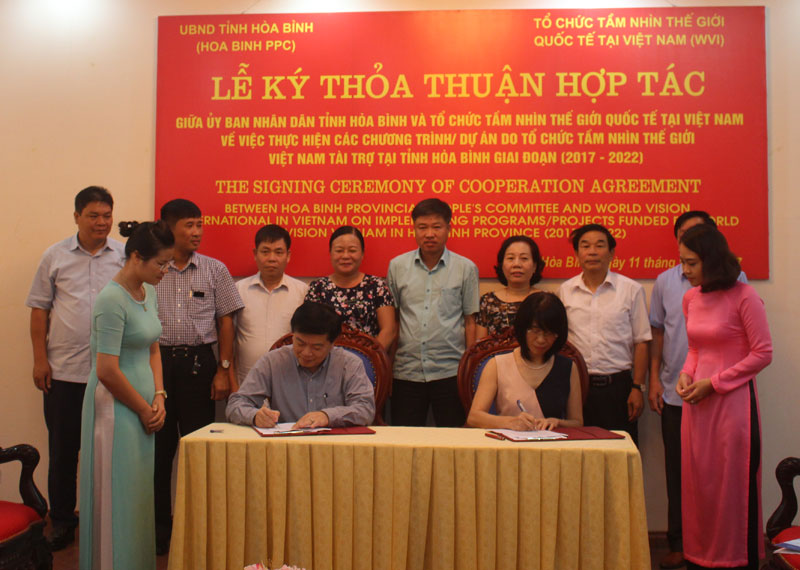
HBO – A cooperation agreement on implementing programmes/projects funded by World Vision Vietnam (WVV) in Hoa Binh province from 2017 – 2022 was signed on September 10 between the provincial People’s Committee of Hoa Binh province and World Vision Vietnam.
The
document was inked by Nguyen Van Chuong, Vice Chairman of the provincial
People’s Committee, and Tran Thi Thu Huyen, National Director of World Vision
Vietnam.

Nguyen Van Chuong, Vice Chairman of the Hoa
Binh People’s Committee, and Tran Thi Thu Huyen, National Director of World
Vision Vietnam, sign the cooperation agreement.
World Vision
Vietnamhas implemented numerous projects in Hoa Binh province since 2009, aiming to
help locals, have more opportunities to address shortcomings on knowledge,
skills, capital resources and management towards sustainable welfare for
children.
Currently, World Vision
Vietnamassists three regional development programmes in Yen Thuy, Mai Chau and Lac Son
with total aid commitments of 6,121,308 USD.
Under the 2017-2022 cooperation agreement, World Vision
Vietnam agrees
to join hands with the provincial People’s Committee to set up and implement regional
programmes, and promote cooperation with sectors to ensure regional programmes’
activities will provide best support possible for the implementation of local socio-economic
development plans. The organisation will seek different resources for the
regional programmes.
The provincial People’s Committee will approve WVV-funded programmes/projects,
and instruct relevant sectors, bodies, and districts to work closely with the
organisation in implementing the programmes/projects.
Hoa Binh will also assist the organisation with necessary administrative procedures,
including tax and and VAT exemption in accordance with the Vietnamese
government’s regulations.
The two sides also committed to implementing regional programmes according to
regulations on aid of non-foreign governmental organisations in
Vietnam.
The total estimated funding for the three regional programmes in Lac Son, Mai
Chau and Yen Thuy is over 4.8 million USD.
The agreement is carried out from October 1, 2017 – September 30, 2022.
The Standing Board of the Hoa Binh provincial Party Committee has agreed in principle on a proposal by the Standing Board of the Party Committee of Hoa Binh city to gather feedback on the city’s 1:2000 zoning plan, which forms part of its broader urban development strategy.
Hoa Binh province has made notable progress in public administration reform and digital government development, with the satisfaction index among citizens and businesses reaching over 84%, according to recent government evaluations.
Thanks to great efforts by local authorities in recent times, the governance and public administration performance of Mai Chau district has been significantly improved.
In the afternoon of June 6, the Party Committee, the People's Council, the People's Committee and the Fatherland Front of Lac Son district solemnly held a meeting to celebrate the 139th anniversary of the district's founding (1886–2025) and the 79th anniversary of the establishment of the district's Party Committee (1946–2025). There was the attendance of Mr. Bui Van Thang, the Vice Chairman of the Provincial People's Council; Mr. Quach Tat Liem, the Vice Chairman of the Provincial People's Committee; Ms. Dang Bich Ngoc, the Deputy Head of the National Assembly Delegation of the province; as well as the former leaders of the province and district through various periods, who are the natives of the district.
Implementing the Politburo’s Resolution No. 57-NQ/TW on breakthroughs in science – technology, innovation, and digital transformation is a golden opportunity for the northern mountainous province of Hoa Binh to renew growth model, improve competitive edge and shorten digital gap.
Resolution 57-NQ/TW, issued by the Politburo on December 22, 2024, identifies sci-tech, innovation, and digital transformation as strategic breakthroughs to build a developed and prosperous nation. In Hoa Binh province, this spirit is not just a slogan, it’s being put into action through concrete initiatives that form a "new development triangle”: digital citizenship, digital economy, and digital administration.



